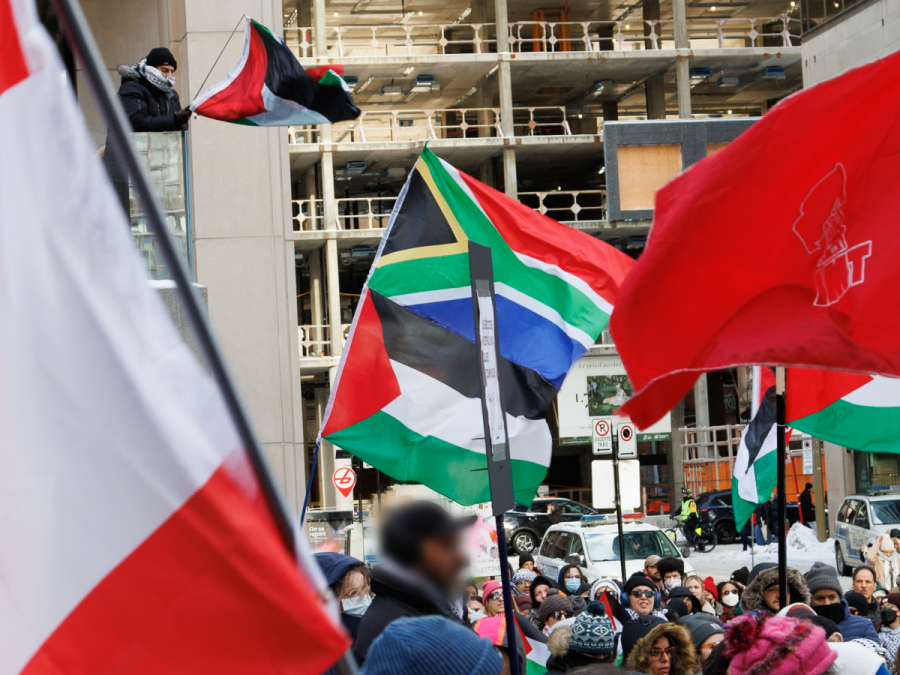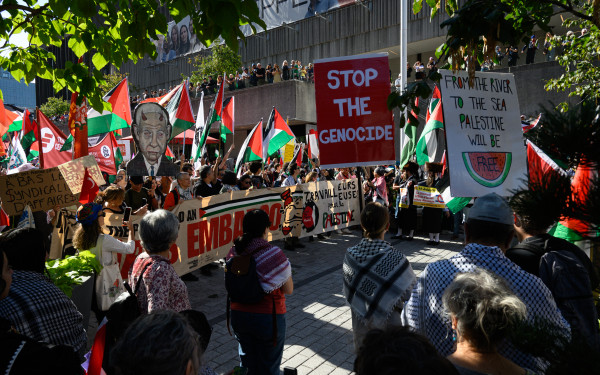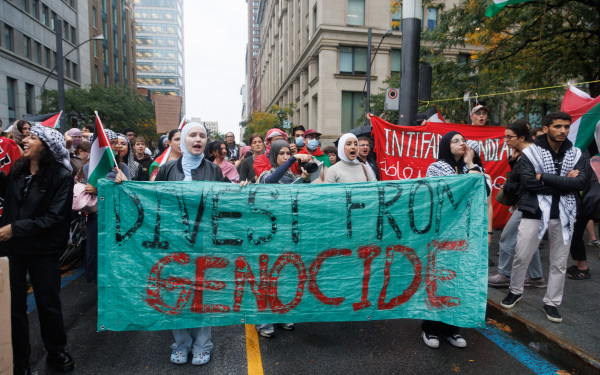Divestment then. Divestment now. Why does it seem tougher?
A look at the historic student-led divestment campaign against Apartheid South Africa and the current against Israel
From 1949 to the early 1990s, South Africa was under the boot of a racist, oppressive, nationalist, segregationist regime.
It went by the name Apartheid, which in Afrikaans translates to 'separateness.' The minority of white South Africans dominated the region socially, economically and politically, impoverishing the Black population. Eighty-six per cent of South Africa's land was apportioned to white people, with the remaining 14 per cent to the Black population per the Native Trust and Land Act enacted in 1936. Sexual relations between different races were illegal. Black people could not vote or form political parties. They had limited access to education and were excluded by law from holding skilled jobs, as they were reserved for whites. The Apartheid government also enforced a mandatory birth control plan for the Black population to suppress their growth.
In the 1960s, activists began denouncing the racist regime by calling for divestment from South Africa. The movement grew to immense popularity in the late 1970s. Student campaigns popped up around the globe demanding their educational institutions to economically isolate from Apartheid South Africa. Upwards of 200 universities and colleges in the United States took part in the grassroots movement against Apartheid, which notably stemmed from Columbia University, Yale, Berkeley and Stanford. Canadian students dually partook in the movement with campaigns from the University of British Columbia, York, Queen's, Dalhousie, University of Toronto, McGill and Concordia.
On Nov. 19, 1985, following years of pressure from anti-Apartheid student activists, McGill became the first Canadian university to divest wholly from South Africa, with York and Dalhousie following soon after. According to The Link's archives, McGill's Board of Governors (BoG) voted 9-4 to divest $45 million CAD from companies doing business in South Africa.
A number of McGill's student activists' success in pressuring the university to comply with their demands can be attributed to the university’s South Africa Committee (SAC). Barbara Jenkins, was a political science student at McGill, the chairman of SAC, an undergraduate representative on McGill's BoG and a student union representative in 1980, a year after SAC's inception.
While she was chairman, her goal was to raise awareness about divestment. Jenkins was at every BoG meeting, consistently bringing up the problematic nature of the university's ties to South Africa.
"It became such a big student movement on campus," Jenkins told The Link. "It became the movement on campus."
She noted that following BoG meetings, the governors would regard her speeches as unimportant. The governors saw Jenkins as no more than ‘cute.’ She recalled an instance where the chair of the BoG at the time allegedly came up to her after she made a rousing speech for divestment, saying: "Oh, my sweet little girl, can I give you a kiss?" Nevertheless, SAC and students united for the cause never backed down.
She explained how the group’s popularity grew rapidly on campus as it organized protests, integrated into student government and continually raised questions at the Senate, while also handing out pamphlets, hosting events, talking to students, going to classes and delivering speeches.
To Jenkins, this persistence, coupled with years of advocacy, yielded success.
"Any successful grassroots movement takes time," she said. "You have to be persistent and keep going, and building and building your influence until […] they can't ignore you anymore."
Jenkins also attributes McGill's divestment to an overall shift in the political tide in 1985.
"It was starting to become more normal around the world to divest," she said.
An example of this shift was in the 1980s when the Canadian government encouraged Canadians to boycott Apartheid South Africa.
"I don't even think I remember Concordia ever divesting formally from South Africa," said Grant Spraggett, former Concordia student and organizer for Concordia University's SAC, later renamed to Concordia Students Against Apartheid (CSAA).
Spraggett is correct. Concordia never divested formally from South Africa. Other associations within Concordia, however, did.
CSAA was pushing for Concordia to divest its funds from the Bank of Montreal (BMO). At the time, the university had more than $54 million in outstanding loans to the South African government and its agencies, according to The Link's archives.
In the same month McGill divested, Concordia's BoG established a 10-member standing committee on social policy to consider divestment, including two members who head companies that bank with BMO.
In 1986, the Concordia University Faculty Association (CUFA) withdrew all the money it had invested in BMO and transferred it to government securities instead, citing moral reasons warranting the decision to divest.
That same year, Concordia University Students Association (CUSA), later renamed the Concordia Student Union (CSU), decided all Carling O'Keefe products would be boycotted and no longer sold by CUSA due to the brewery's ties and "symbolic connections" to South Africa.
Spraggett was on CSAA until he graduated in about 1985. He had found and shortly after joined CSAA while they were tabling.
"We used to set up tables everywhere," Spraggett noted. CSAA would set up their tables outside the Hall building cafeteria and spark up conversations with other students, screen documentaries, hand out flyers and advertise events.
According to Spraggett, CSAA was primarily an educational group with the goal of mobilizing divestment locally.
"Divestment was a core issue, which is why the local was involved,” Spraggett emphasized. “We are implicated, and we should know that we can do something about it."
CSAA may not have had the same campus influence compared to McGill’s SAC, but they made due.
"We showed movies because you didn't see much about Apartheid on the news," Adrian Archer told The Link. "The movies dealt with the personal lives of these people under this regime that controlled your life from cradle to grave."
Like Spraggett, Archer chatted with students who stopped by the CSAA table to provide context about the reality of Apartheid.
"I would also explain to people on the tables what Apartheid was like," said Archer, who educated himself extensively on the matter at the time. "I could give students the concrete information that they could identify with, and that was key to me.”
Spraggett, Archer and Jenkins all agree that the anti-Apartheid movement took time but was nonetheless successful, and was nowhere near as complicated and widely-debated as the current divestment movement against Israel.
"There was no other side to the anti-Apartheid movement, merely inertia and indifference," Spraggett said.
“The support South Africa had was not equivalent to the support Israel has from, for example, the United States,” Archer said.
Pro-Palestinian activists and students in Montreal have long been calling on Concordia and McGill for an academic boycott and divestment from Israel. The pressure has only increased as Israeli attacks have killed more than 40,000 Palestinians in Gaza since Oct. 7, 2023. The coalition of pro-Palestinian students leading the demand on university divestment, the Montreal Popular University of Gaza, is composed of and supported by organizations like Solidarity for Palestinian Human Rights McGill and Concordia, and Palestinian Youth Movement Montreal. This student movement follows a similar framework to the academic boycott of Apartheid South Africa in the 1980s, which contributed to the liberation of Black South Africans. Students are demanding the university comply with the Boycott, Divestment, Sanctions (BDS) movement, which works to "end international support for Israel's oppression of Palestinians and pressure Israel to comply with international law."
The CSU voted to divest from Scotiabank in March due to accusations of the bank investing in Elbit systems, which produce weapons for the Israeli Defense Force. However, in the past few years, it has made no by-laws or public statements about divestment or BDS. In the 1980s, the CSU voted in agreement that the university should divest from entities tied to and funding the Apartheid state of South Africa. The CSU has yet to respond to The Link's request for comment after multiple attempts to clarify the union's stance on divestment, particularly in alignment with the BDS movement.
Concordia has made its stance on BDS crystal clear.
"Concerning BDS specifically, [Concordia] stated clearly in 2014 that barring contact with other universities and scholars would be contrary to the value of academic freedom—a pillar of all universities," Concordia spokesperson Vannina Maestracci said.
Though the current academic boycott against Israel follows the same structure as the one in the 1980s, activists are having a harder time garnering support because it is a much more divisive matter.
Michael Bueckert, vice president of Canadians for Justice and Peace in the Middle East, compared the South African anti-Apartheid movement to the current BDS movement in his PhD dissertation. Bueckert said he believes that, even if the same tactics are being applied to a new case of oppression, pro-Palestiain activists are having a more challenging time building a case as the movement is being framed as an issue of antisemitism.
He explained how there was a fringe of people who believed the boycott of South Africa was racist to white South Africans, "yet very few people fell for that," Bueckert said.
"Whereas, with the history of Jewish persecution and genocide, I think people are much more likely to see the sorts of claims as credible when you say that boycotting Israel is racist," he said.
Like Jenkins, Bueckert added how it takes time to thrust a movement into the agreeable mainstream with many social dynamics changing the way people think about a movement's credibility.
"The anti-Apartheid movement in the South Africa case really spent decades organizing before they really got a lot of traction," Bueckert said.
In 2016, Parliament voted to condemn Canadians who used divestment tactics against Israel in solidarity with Palestinians, signalling to activists Canada's strong stance with Israel. However, Bueckert notes that with persistent movements, each small step taken toward liberation is an example of the changing tide, like Canada halting arms sales to Israel.
"[This] is something that, a year previously, we couldn't have imagined," Bueckert noted.
To Bueckert, it is not just students but all areas in civil society that need to demand change to spur the Canadian government into action. However, he believes students are essential to spearheading movements and building momentum that addresses complicity domestically.
"Power speaks its own language, and that language is often money. So long as there is money to go after, sites of resistance will be crushed," Spraggett said. "But when money is held back from the powerful, that is one hope we might have."
This article originally appeared in Volume 45, Issue 1, published September 3, 2024.







